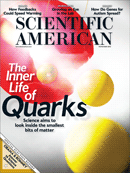
SCIENTIFIC AMERICAN
metrics 2024
Bridging Science and Society Since 1947
Introduction
SCIENTIFIC AMERICAN, published by Springer, stands as a prestigious multidisciplinary journal dedicated to disseminating cutting-edge scientific knowledge across a range of fields. Established in 1947, this journal has been integral in bridging the gap between scientific research and public understanding, making complex ideas accessible to a broader audience. With an ISSN of 0036-8733 and E-ISSN of 1946-7087, it maintains a strong standing within the academic community, currently ranked in the Q3 category for its multidisciplinarity, and is positioned at #93 out of 120 in its Scopus ranking, reflecting its valuable contribution to scientific discourse. While the journal is not open access, its long history and commitment to knowledge sharing ensure it remains a vital resource for researchers, professionals, and students alike, fostering a deeper appreciation of science in society.
Metrics 2024
 0.16
0.16 3.10
3.10 1.90
1.90 100
100Metrics History
Rank 2024
Scopus
IF (Web Of Science)
JCI (Web Of Science)
Quartile History
Similar Journals

Cultura Cientifica
To Illuminate the Path of Scientific Discovery.Cultura Cientifica is a distinguished open-access journal published by FUNDACION UNIV JUAN CASTELLANOS, dedicated to fostering scientific knowledge and community engagement within the field of science and technology. With an ISSN of 1657-463X and an E-ISSN of 2389-9638, the journal has been providing unrestricted access to research since its inception in 2001, effectively contributing to the dissemination of valuable scientific insights. Based in Tunja, Boyacá, Colombia, "Cultura Cientifica" aims to serve as a platform for researchers, professionals, and students by featuring high-quality research articles, reviews, and case studies that reflect the latest advancements and debates in the scientific community. Although the journal does not currently have an H-index or Scopus ranking, its commitment to open access and knowledge sharing makes it an essential resource for those seeking to expand their understanding and impact within the scientific discourse.
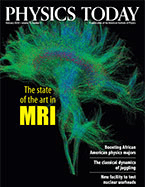
PHYSICS TODAY
Unveiling the Wonders of the Physical WorldPHYSICS TODAY is a prestigious journal published by the American Institute of Physics, serving as a pivotal platform for the dissemination of innovative research and developments in the field of physics and astronomy. With an ISSN of 0031-9228 and an E-ISSN of 1945-0699, this journal has been in circulation since 1948 and is set to continue until 2024. Recognized for its substantial contributions to the scientific community, PHYSICS TODAY holds a significant position within the Q2 quartile of the Physics and Astronomy category as of 2023. Although it does not offer open access, its articles remain crucial resources for researchers, professionals, and students seeking to stay abreast of the latest advancements across a broad range of topics in general physics and astronomy. With a current Scopus ranking of #150 out of 243 and a percentile standing at 38, the journal bolsters its reputation as a reliable source for high-quality scientific discourse. In an era of rapid scientific advancement, PHYSICS TODAY remains dedicated to fostering a deeper understanding of the physical universe, making it an essential read for those invested in the future of physics.
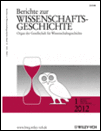
Berichte zur Wissenschaftsgeschichte
Exploring the Nexus of Science and HistoryBerichte zur Wissenschaftsgeschichte is a distinguished journal dedicated to the critical exploration of the history of science and its philosophical underpinnings, published by WILEY-V C H VERLAG GMBH in Germany. Since its inception in 1978, this authoritative journal has served as a vital resource for scholars, practitioners, and students alike, contributing to a deeper understanding of scientific developments across historical contexts. The journal holds a respectable Scopus rank in the arts and humanities, placing it in the 79th percentile among history publications and the 56th percentile in history and philosophy of science, marking it as an essential venue for impactful research. Berichte zur Wissenschaftsgeschichte encourages contributions that advance scholarly dialogue and foster an interdisciplinary approach, making it a pivotal platform for the exchange of ideas in the evolving discourse of science history. While it currently does not offer Open Access options, the journal's subscription model ensures that its curated content remains accessible to a global audience dedicated to the interdisciplinary analyses of science's past.

Sociologia Nauki i Tehnologij-Sociology of Science & Technology
Fostering Dialogue on the Societal Dimensions of Scientific ProgressSociologia Nauki i Tehnologij-Sociology of Science & Technology is a distinguished journal dedicated to exploring the intricate relationships between science, technology, and society. Published by the Institute of History of Science and Technology, Saint Petersburg Branch, Russian Academy of Sciences, this journal serves as a vital platform for interdisciplinary research and discourse within the fields of sociology, science studies, and technology assessment. The journal encourages contributions that delve into the societal implications of scientific advancements and technological innovations, making it essential reading for researchers, professionals, and students alike. Although specific impact factors and access options are currently not provided, the journal is committed to maintaining high academic standards and fostering a rich scholarly community. Join us in advancing the understanding of how science and technology shape human experiences across diverse contexts.

Nuncius-Journal of the History of Science
Exploring the Crossroads of Science and HistoryNuncius - Journal of the History of Science, published by BRILL, is a vital resource dedicated to the exploration and analysis of the intricate relationship between science and its historical context. Established with the goal of fostering scholarly discussion, this journal serves as a platform for researchers and historians to present their findings and interpretations regarding the evolution of scientific thought. With an impact factor reflective of its academic rigor and ranked in the Q3 category in the field of History and Philosophy of Science, it offers a rich archive of articles spanning converged years from 1986 to 2024. Nuncius encourages submissions that advance the understanding of science's impact on society, culture, and its philosophical underpinnings, making it a key reference for those engaged in the histories that define modern scientific inquiry. Situated in the scholarly landscape of the Netherlands, Nuncius remains an essential read for professionals, students, and academics seeking to deepen their knowledge in this significant field.

PHILOSOPHY OF SCIENCE
Navigating the Nexus of History, Philosophy, and SciencePHILOSOPHY OF SCIENCE, published by Cambridge University Press, serves as a premier journal at the intersection of history, philosophy, and science, making significant contributions to our understanding of scientific inquiry and its historical contexts. With an impressive impact factor reflected in its 2023 Category Quartiles—ranking Q1 in History, Q1 in History and Philosophy of Science, and Q1 in Philosophy—this journal stands out as a vital resource for researchers, professionals, and students alike. Operating without Open Access, it encourages the dissemination of groundbreaking ideas from 1949 through 2024, illustrated by its robust Scopus rankings, including a remarkable 98th percentile in the History category. Based in the United Kingdom at the prestigious Cambridge campus, PHILOSOPHY OF SCIENCE is committed to fostering scholarly dialogue and advancing critical thought in the philosophy of science.
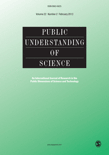
PUBLIC UNDERSTANDING OF SCIENCE
Bridging the Gap Between Science and SocietyPUBLIC UNDERSTANDING OF SCIENCE, published by SAGE PUBLICATIONS LTD, stands as a crucial multidisciplinary journal dedicated to exploring the intricate relationship between science and society. With its well-established history from 1992 through to 2024, this journal offers an essential platform for researchers, professionals, and students interested in the communication of scientific knowledge and its impact on public perception. Recognized for its high academic standards, it proudly holds a Q1 ranking in the categories of Arts and Humanities, Communication, and Developmental and Educational Psychology, signifying its significant influence and contribution to these fields. The journal’s impressive percentile rankings further underscore its vital role in advancing scholarship, interaction, and understanding in the public discourse of science. Although it does not currently offer open access options, the journal is committed to disseminating scholarly research that informs and enriches the dialogue on critical scientific issues, making it a pivotal resource for anyone engaged in or studying the dynamics of science communication.
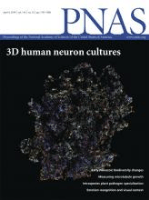
PROCEEDINGS OF THE NATIONAL ACADEMY OF SCIENCES OF THE UNITED STATES OF AMERICA
Fostering Breakthroughs in Multidisciplinary ResearchPROCEEDINGS OF THE NATIONAL ACADEMY OF SCIENCES OF THE UNITED STATES OF AMERICA (PNAS) is a premier multidisciplinary journal published by the National Academy of Sciences, dedicated to the publication of innovative research across a wide array of scientific disciplines. With an impressive impact factor and ranked within the top 5% of journals in its field (Scopus Rank #8/171), PNAS epitomizes excellence in scientific scholarship since its inception in 1945. The journal fosters the dissemination of groundbreaking scientific discoveries, offering vital insights and advancements that impact both academia and industry. Although it operates under a subscription model, PNAS remains a critical resource for researchers, professionals, and students striving for knowledge in various scientific domains. Its rigorous peer-review process and commitment to high-quality publications ensure that it continues to serve as an authoritative source of information and inspiration within the global scientific community.
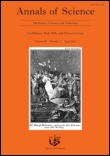
ANNALS OF SCIENCE
Connecting Past Discoveries with Future PhilosophiesANNALS OF SCIENCE, published by Taylor & Francis Ltd, is a pivotal journal in the field of the History and Philosophy of Science, as evidenced by its Q3 categorization and a respectable Scopus rank of 99 out of 223, placing it in the 55th percentile among its peers. With a rich history dating back to its initial publication in 1936, the journal has made significant contributions to scholarly discourse, providing a platform for researchers and academics to explore the intricate connections between scientific developments and philosophical inquiries. The journal's commitment to rigorous academic research ensures that it remains a vital resource for professionals, educators, and students dedicated to understanding the evolution of scientific thought. Although it operates under traditional subscription models, the journal's importance in shaping modern scientific discussions cannot be overstated, making it an essential read for those engaged in the multifaceted study of science's history and philosophical implications.

NATURE
Championing Excellence in Scientific InquiryNATURE, published by NATURE PORTFOLIO, stands as a premier academic journal in the field of multidisciplinary sciences, and has consistently ranked number one in its category, reflecting its influence and prestige with an impressive 99th percentile position among 171 journals in the Scopus rankings. With an illustrious history dating back to 1869, this journal serves as a critical platform for disseminating pioneering research and groundbreaking discoveries across a myriad of disciplines. While it maintains a traditional publishing model, NATURE's significance is underscored by its high impact factor, making it an essential resource for researchers, professionals, and students seeking to stay at the forefront of scientific advancements. The journal's headquarters are located in Berlin, Germany, and it continues to shape the scientific dialogue globally.